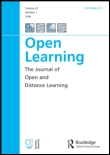
Open Learning
Scope & Guideline
Innovating Pedagogy for a Digital Age
Introduction
Aims and Scopes
- Open Educational Resources (OER):
The journal emphasizes the importance of OER as a means to enhance educational accessibility and equity. It explores how these resources can be effectively integrated into various educational contexts to improve teaching and learning outcomes. - Blended and Hybrid Learning Models:
Research on blended and hybrid learning approaches is a core focus. The journal examines the effectiveness of these models in different educational settings, including higher education, and their impact on student engagement and performance. - Digital Pedagogy and Technology Integration:
The integration of digital technologies in teaching practices is another key area. The journal investigates innovative pedagogical strategies that leverage technology to enhance learning experiences and outcomes. - Professional Development for Educators:
The journal also addresses the professional development of educators, particularly in the context of online and distance learning. It explores how training and support can empower educators to adopt and implement open educational practices effectively. - Learner Engagement and Experience:
A significant focus is placed on understanding learner engagement, experiences, and outcomes in online and distance learning environments. Research in this area aims to identify strategies that enhance student motivation and success.
Trending and Emerging
- Impact of the COVID-19 Pandemic on Education:
Recent publications highlight the profound effects of the COVID-19 pandemic on educational practices, including shifts to online learning, challenges faced by educators and students, and innovations that arose in response to these challenges. - Learning Analytics:
There is a growing interest in learning analytics as a tool to enhance educational practices. Research is focusing on how data can be used to improve learner outcomes and inform instructional strategies. - Microlearning and Continuous Professional Development:
Emerging themes around microlearning and its role in continuous professional development for educators are gaining attention, reflecting a shift towards more flexible and adaptive learning approaches. - Hybrid Learning Models:
The exploration of hybrid learning models is increasingly prominent, particularly in understanding their effectiveness, implementation challenges, and learner perceptions in diverse educational contexts. - Digital Equity and Access:
Research on digital equity and access is on the rise, addressing the disparities in educational opportunities created by varying levels of technology access among students, especially in the context of online and distance learning.
Declining or Waning
- Traditional Distance Learning Models:
Research focused solely on traditional distance learning models has decreased, likely due to the increasing adoption of blended and hybrid approaches that incorporate more interactive and technology-driven methods. - General Theories of Distance Education:
There appears to be a waning interest in broad theoretical frameworks of distance education. More specific and practical applications of these theories in contemporary contexts are gaining traction instead. - Static Educational Resources:
The exploration of static educational resources, which do not evolve or adapt to learner needs, has declined. The focus has shifted towards dynamic and interactive resources that promote engagement and adaptability.
Similar Journals
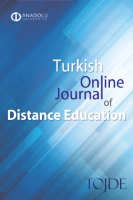
Turkish Online Journal of Distance Education
Elevating Distance Learning Discourse.Turkish Online Journal of Distance Education, a distinguished publication from ANADOLU UNIVERSITY, serves as a vital resource in the field of distance education, contributing significantly to the ongoing discourse since its inception in 2000. With an impressive impact factor that reflects its standing within the academic community, this open access journal provides an influential platform for researchers, educators, and practitioners to disseminate innovative findings and educational strategies. Ranked in the Q2 category within the education sector according to the 2023 quartile rankings, and boasting a commendable position of #423 out of 1543 in Scopus' Social Sciences Education rankings, the journal places itself firmly within the 72nd percentile of its cohort. Spanning from 2004 to 2024, the journal's commitment to advancing scholarship in distance education is reflected not only in its comprehensive articles but also in its responsive engagement with contemporary educational challenges. Positioned in Eskişehir, Turkey, this journal aims to elevate discussions surrounding online learning and contributes to the global dialogue on education accessibility and innovation.

Journal of Asia TEFL
Advancing English Education Across AsiaWelcome to the Journal of Asia TEFL, a leading peer-reviewed platform dedicated to exploring the intersections of English language education, linguistics, and the dynamic educational landscapes of Asian contexts. Published by ASIA TEFL in South Korea, this journal has emerged as a pivotal resource for academia since its inception in 2004, with consistently expanding influence reflected in its Scopus rankings, including a notable 76th percentile in Linguistics and Language. With a focus on the evolving methodologies and pedagogical innovations in English language teaching, the journal aims to foster scholarly discussions that enhance teaching practices and policy-making in a globalized world. Although it currently operates without open access, its rigor and relevance in categories such as Education and Linguistics ensure that it remains a valuable asset for researchers, educators, and students seeking to advance their knowledge and practice within this vital field of study.

Journal of Computers in Education
Empowering Education through Innovative Technology.The Journal of Computers in Education is a distinguished academic journal published by SPRINGER HEIDELBERG, dedicated to advancing the intersection of technology and pedagogy. With an ISSN of 2197-9987, this journal has established itself as a pivotal resource for researchers and educators alike since its inception in 2019, maintaining a strong focus on innovative applications of computer science within educational contexts. Ranked in the Q1 category in both Computer Science Applications and Education, the journal demonstrates a high impact in its field, holding a remarkable position within the top 1.5% of journals in social sciences (rank #20/1543) and top 5.5% in computer science applications (rank #45/817). The journal's scope encompasses a wide range of topics including but not limited to educational technologies, e-learning methodologies, and the effective integration of computers in teaching, making it an essential source for professionals and students who are keen to explore cutting-edge research and trends. Although access options vary, the journal's commitment to disseminating quality research continues to enrich the academic landscape in Germany and beyond, nurturing the synergies between education and technology.

Problems of Education in the 21st Century
Innovating Solutions for Today's Educational Issues.Problems of Education in the 21st Century is a pivotal academic journal published by SCIENTIA SOCIALIS, focusing on the ever-evolving challenges and opportunities in the field of education. With its ISSN 1822-7864 and E-ISSN 2538-7111, the journal serves as an essential resource for researchers, educators, and policy makers interested in exploring contemporary educational issues, innovations, and practices. Although currently not indexed in Scopus, the journal has previously covered contributions between 2017 and 2019, providing a platform for critical dialogue in the field. Based in Lithuania, it emphasizes an open-access approach, fostering wide dissemination of research that informs educational advancements. With a Scopus rank in the 20th percentile within the Social Sciences and Education category, the journal invites contributions that examine significant topics impacting education today, ensuring a broad spectrum of scholarly discussion aimed at enhancing teaching and learning experiences in the 21st century.

Online Learning
Exploring the Frontiers of Virtual LearningOnline Learning is a premier, open-access journal dedicated to advancing research and practice in the field of online education. Published by the ONLINE LEARNING CONSORTIUM, the journal has been a critical resource since its inception in 2014, bringing together innovative studies and discussions that shape the future of digital learning environments. With its impact factor significantly acknowledged in the field, Online Learning proudly holds a Q1 ranking in both Computer Networks and Communications and Education categories, highlighting its influential impact within the academic community. Its rankings in Scopus also underscore the journal's commitment to quality research, featured in the 92nd percentile in Social Sciences and 79th percentile in Computer Science. Researchers, educators, and professionals benefit from a rich array of open-access articles that address current trends, methodologies, and case studies in online learning, making it an essential platform for knowledge exchange. With a focus on fostering collaboration and innovation, Online Learning serves as a vital resource for those looking to explore transformational educational practices in an increasingly digital world.
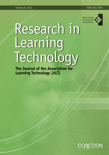
Research in Learning Technology
Transforming Education Through Cutting-Edge Technology InsightsResearch in Learning Technology, published by the Association for Learning Technology (ALT)impact factor, the journal has consistently ranked in the top quartiles of both the Education (Q1) and Computer Science Applications (Q2) categories as of 2023, highlighting its significance and influence in the academic community. The journal is committed to disseminating high-quality research and practical insights that bridge the gap between technology and pedagogy, making it an essential resource for researchers, educators, and practitioners alike. The Scopus rankings further emphasize its reputation, placing it in the top 10% of social sciences education journals. As an open-access journal, Research in Learning Technology ensures that its valuable content is freely accessible, empowering a global audience to drive innovation in learning technology. Whether you are a seasoned researcher or a student exploring this dynamic field, this journal serves as a vital platform for sharing knowledge and advancing the discourse in learning technologies.
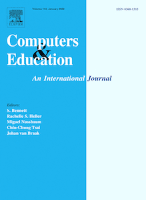
COMPUTERS & EDUCATION
Exploring the future of digital learning environments.COMPUTERS & EDUCATION is a prestigious journal published by Pergamon-Elsevier Science Ltd, dedicated to advancing the understanding of the interplay between computer technology and education. With a remarkable impact factor and ranking in the Q1 category for both Computer Science and Education, this journal stands out in delivering high-quality research and innovative insights into e-learning practices. Covering a broad spectrum of topics from digital learning tools to the integration of technology in educational contexts, it serves as an essential resource for researchers, educators, and policymakers alike. Since its inception in 1976, COMPUTERS & EDUCATION has provided a platform for scholarly discussions, shaping the future of technology-enhanced learning. The journal is based in the UK, and while it does not currently offer Open Access, it remains a vital contributor to the field through its extensive publication history, converging research until 2024.
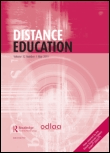
Distance Education
Innovating Pedagogy for a Connected WorldDistance Education is a premier academic journal published by Routledge Journals, Taylor & Francis Ltd, specializing in the dynamic and rapidly evolving fields of education and e-learning. With an impressive impact reflected in its Q1 rankings in both education and e-learning categories for 2023, this journal stands out as a leader in disseminating high-quality research and innovative practices that inform and inspire educators, policymakers, and researchers globally. The journal has been at the forefront of distance education studies since 1980 and continues to provide critical insights into pedagogical approaches, technological advancements, and learner engagement methodologies. Although it does not offer open access options, its rigorous peer-review process ensures that contributions are both impactful and relevant. Located in the United Kingdom at 2-4 Park Square, Milton Park, Abingdon, OX14 4RN, Oxon, England, it serves as an essential resource for anyone invested in the future of education, aiming to bridge the gap between traditional and online learning environments.

E-Learning and Digital Media
Transforming education through digital innovation.E-Learning and Digital Media, published by SAGE Publications Inc, is a premier academic journal dedicated to the innovative intersection of digital technologies and education. With a strong commitment to advancing research in the fields of education and computer science, this journal has established itself as a vital resource for researchers, professionals, and students alike. As of 2023, it proudly holds a Q2 ranking in both Computer Science Applications and Education, reflecting its impact and reach within the academic community. The journal encompasses a wide range of topics exploring the effectiveness and applications of e-learning technologies, pedagogical strategies, and digital media in educational settings. Since its inception in 2009, E-Learning and Digital Media has continuously contributed to the understanding and development of digital education, ensuring relevancy in an ever-evolving landscape. With an open access model intended to foster accessibility and dissemination of knowledge, this journal invites submissions that push the boundaries of traditional education through cutting-edge research and practice.
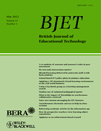
BRITISH JOURNAL OF EDUCATIONAL TECHNOLOGY
Transforming Education through Cutting-Edge ResearchBRITISH JOURNAL OF EDUCATIONAL TECHNOLOGY, published by Wiley, is a leading journal in the field of educational technology, recognized for its commitment to advancing research and practice in this dynamic arena. With an impressive impact factor that places it in the Q1 quartile for both Education and E-learning in 2023, it serves as a critical resource for academics, practitioners, and policymakers alike. This journal, with an established publication history since 1970, focuses on the integration of technology in educational settings, aiming to disseminate innovative findings and facilitate discussions that enhance learning experiences. Researchers contributing to the journal address diverse topics from digital learning environments to the pedagogical implications of emerging technologies, ensuring comprehensive coverage of the latest trends and methodologies. Submissions are welcomed in various formats, promoting collaborative scholarly dialogue in fostering effective educational practices. Access to the journal is available through traditional subscription frameworks, ensuring broad accessibility for institutions and individuals invested in the advancement of educational technology.